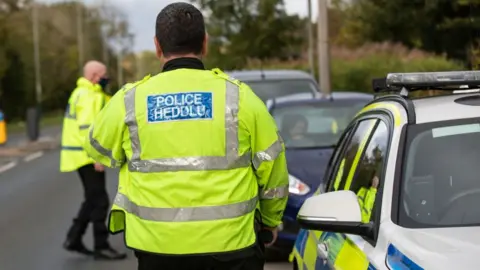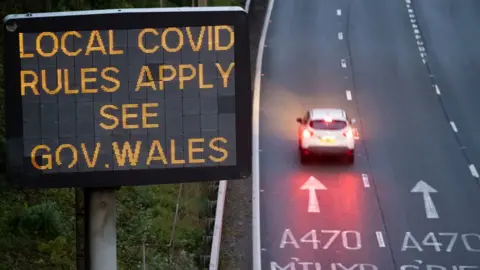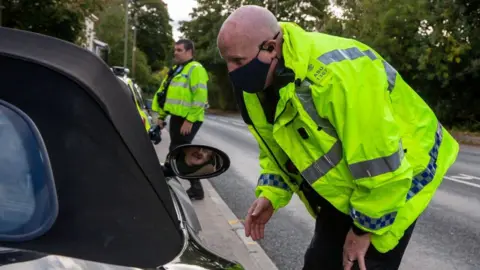Covid: Wales travel ban plan 'risks division'
 Getty Images
Getty ImagesWales' plan for travel restrictions on people visiting the country from UK Covid hotspots risk "stirring division and confusion", the UK government's Welsh Secretary has said.
Simon Hart criticised First Minister Mark Drakeford for saying people in west Wales will be on the "lookout" for those who should not be there.
The ban is planned to come into force at 18:00 BST on Friday.
The Welsh Government said Mr Drakeford would respond "in due course".
Meanwhile the first minister has said the police will have extra patrols on main roads into Wales.
In a letter to Mr Drakeford Mr Hart said he was seeking "urgent clarification" from the first minister over his plans to introduce travel restrictions on people visiting Wales from Covid hotspots elsewhere the UK.
Mr Hart asks for the publication of evidence showing that the measures are proportionate and to see the legal advice "that confirms that these decisions are lawful".
"I remain worried that, without rapid explanation, this approach risks stirring division and confusion in Wales."
Referring to an interview Mr Drakeford conducted with Times Radio, Mr Hart said: "Your recent comment about residents in West Wales being 'on the lookout for people who shouldn't be in those areas' is an example of exactly the situation we should be trying to avoid."
Mr Hart also questioned the enforceability of the measures and asks for further detail on how the restrictions will work, and what exemptions there might be.
Mr Drakeford says he sent evidence of transmission from high-Covid areas in England to low-Covid areas in Wales when he wrote to the prime minister asking him to take action
The Welsh Conservatives say the research paper acknowledged there was no definitive proof.
He asked for a reply by 16:00 on 16 October - two hours before the ban starts.

About 2.3 million people in 17 areas of Wales are already subject to a bar on travel, albeit with exceptions for school, work and other limited reasons.
It is expected the ban on people from Covid hotspots elsewhere in the UK will have similar exceptions.
Areas to be covered include Tier 2 and 3 regions in England, the whole of Northern Ireland and the Scottish central belt.
It will come into force on Friday at 18:00 BST.
On Wednesday night Mark Bleasdale, the Police Federation's Welsh lead, said: "On the face of it, this is unenforceable because of the difficulty of identifying where people are coming from and where they are going to.
"There will also be plenty of individuals travelling legitimately from areas which are not high risk, and this will only add to the other difficulties officers face when policing the existing regulations."
 Getty Images
Getty ImagesOn BBC Breakfast Mr Drakeford said there would be "extra patrols on the main roads coming into Wales" when the ban starts on Friday at 18:00 BST.
Mr Drakeford said fines would be the "final resort, not the first resort" and number plates could be used to identify people from Covid hotspots.
"I believe the police will have a range of techniques and number plate recognition will be one of them," he said.
"What we want to do is to reinforce the message to people that this is a public health emergency that they should not be travelling from high incidence areas to low incidence areas".
"We're reinforcing that rule here in Wales - most people we know want to do the right thing.
"And this is an attempt to make sure that, just as Welsh people in high-incidence areas aren't able to travel out to those areas, people from beyond Wales aren't able to do that."
What have police forces said?
The law will cover travel to parts of Wales not under local restrictions: Anglesey, Gwynedd - with the exception of Bangor, Ceredigion, Pembrokeshire and Carmarthenshire - with the exception of Llanelli.
Dyfed-Powys Police said: "Our approach throughout has been to engage with the public, educate them about the guidelines, encourage them to follow the rules, with enforcement only as a last resort. This approach will not change."
"Where people were not adhering to the regulations, we did and will enforce."
North Wales Police said it would "review the regulations when published and we will continue to support Welsh Government in trying to slow down the spread of the virus".
It said it would "be increasing our visibility on the strategic road network and undertaking targeted activity".
"We will continue to engage, explain, encourage and enforce where required."
Drakeford 'lookout' comments criticised
Mr Drakeford was criticised by Preseli Pembrokeshire MP Stephen Crabb for comments on Times Radio where the first minister said people in the "far west of Wales" would be "on the lookout for people who shouldn't be in those areas".
Mr Crabb tweeted that Pembrokeshire had been "rammed with visitors from all over the UK in August who overwhelmingly enjoyed their stays while respecting guidelines", claiming there had been "no impact on community transmission of the virus".
"Drakeford is wrong to whip up anti visitor (English) sentiment," he wrote.
Commons leader Mr Rees-Mogg accused the Welsh Government of "putting a border between England and Wales" that was "unconstitutional and will place the police in an invidious position considering that they serve the whole of the United Kingdom".
"We are one single United Kingdom and we should not have... borders between different parts of the United Kingdom."
"And I'm afraid that is what you get when you vote for socialists," he told the Commons on Thursday.
